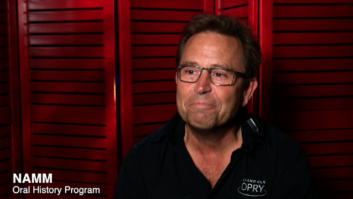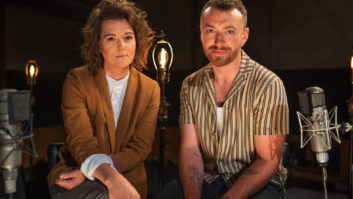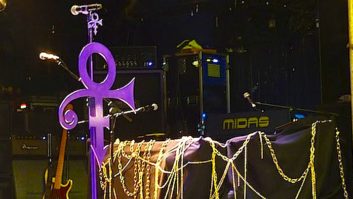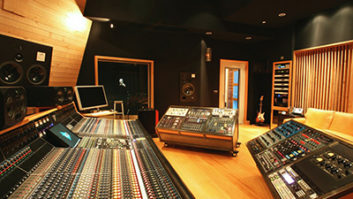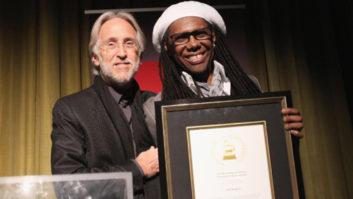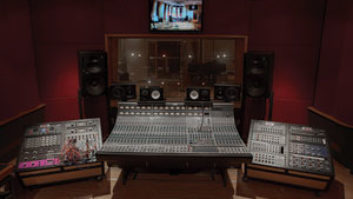Percussionist/singer/producer Sheila E.’s musical persona is an amalgamation of funk, sexiness, tantalizing pop/R&B-styled melodies and hard-driving Latin rhythms. But for her latest Concord Records CD, Writes of Passage, the former Magic Johnson talk show bandleader and one-time Prince collaborator took a more relaxed approach than on her previous recordings. This is not to imply that the project is easy listening or background music; rather, it resonates with more easy-going contemporary jazz stylings.
“I wanted to work with my band E-Train, play drums, congas, percussion and sing a little bit, and not have it be as commercial as a pop record,” explains Escovedo from the offices of her San Fernando Valley-based company, Heaven Productions. There, she produces music for television specials and also writes and produces for other artists. “I was looking for something that allowed me to express myself musically in that field and collaborate with some of the other musicians. I wrote music that’s Latin jazz, Brazilian, with a little bit of R&B. But with that mixture, I didn’t want to be worried about it being commercial enough to get played on radio.”
Escovedo’s last album, Sex Cymbal, was released in 1992 and left her with a less than favorable impression of the current record industry. Following that disappointment, she maintained a high profile as an unsigned artist working with a slew of different performers and appearing on numerous shows, film soundtracks, charity events and concert tours, ranging from David Letterman’s show to the Academy Awards to a tribute to Dizzy Gillespie to touring with Latin/pop vocalist Jennifer Lopez. At this point, Escovedo is a first-call percussionist, known the world-over for her incredible chops and her striking beauty.
Although she was involved with many other artists, she says she never lost sight of her own music, maintaining at least six different bands during the period when she wasn’t recording. Predictably, most record companies were only interested in the more commercial aspects of her music, which she found uncomfortably limiting and creatively repressive. “It’s hard to do only one type of music,” Escovedo comments. The possibility of doing a little bit of everything on a CD was suggested to her, too. “To do all that — funk, pop, gospel, fusion and Latin jazz — on one record, then there’s no direction,” she continues. “And that’s difficult for marketing purposes as well.”
Eventually, in 1998, Escovedo decided to create Writes of Passage on her own with her long-standing touring band. “Most of these guys I’ve played with since about ’93,” she notes. “Then we went out a couple of years ago, because I really wanted to play. We did about two months that included Europe, Japan and here in the States. It was lots of club dates, and we probably sold out 98 percent of all the shows. That was without a record or publicity. It was just the fans respecting the work I do, which is good.”
After attempting to market and distribute the CD independently through alternative methods, including the Internet, she signed with Concord Records. “They had asked me four years ago to sign with them, because my father, [percussion legend] Pete Escovedo, is on their roster. But I wasn’t ready still,” Escovedo explains. “They came back later and gave me a great offer. It allows me to do great projects, which could be with any of the different bands I have. We’ll be doing music that’s not as commercial, but good music that I grew up listening to.”
Writes of Passage is a mostly instrumental affair that incorporates elements of her Mexican heritage. There is certainly a retro element to the approach but it’s balanced with contemporary sensibilities. The recording has moments of intense jamming but, by and large, is a relaxed affair, which is exactly what Escovedo wanted for a working environment. “I just called the guys,” she recalls, “and said, ‘Look, we’ll try to do a record and give ourselves about nine days.’
“The original band was a lot more fiery than this record is,” she continues, “because [trumpeter] Charlie Sepulveda was such a big part of the sound. Everything was already worked out for everyone to come down to my place. I called Ray Obiedo at the last minute, because [Charlie] couldn’t make it the day before; it was that close. So I said we just were going to change some things, but it’s still going to be a great record. So I think that it’s okay that it happened like that.
“I like change, and it allows me to grow in so many different ways. If I stayed the same, I don’t think I’d still be in the business. We were able to play together, and created a lot of songs on the spot. Some of them were already worked out prior to the sessions. It was fun to play ‘Virtuosity,’ which was [bassist] Mark Van Wageningen’s song. He brought me an idea and I arranged it. It was cool to play, and he was real excited because he never had a song done on someone’s record before. I got to stretch out on it, too. Also, there were one or two songs that were almost like ‘first takes’; that was it.”
The recording sessions for Writes of Passage took place at the percussionist’s tri-level home in Woodland Hills, Calif., in part to keep costs down. It also gave Escovedo the freedom to play impulsively and as long as necessary to work things out. “It was very cool,” she affirms. “I didn’t have to leave my house. We brought food in and I had a pool table in the living room. It was very relaxed, and we had a very good time.
“Basically, the studio was in the garage, and I set my drums up in my bedroom. It’s huge with a 30-foot ceiling, and I also had a piano in there. We recorded the saxophone player in the bathroom and the acoustics were great. You’d never know it, but he was standing between the sink and the bathtub with his music stand in the bathtub. It was pretty funny, but it worked. The bass, guitar and keyboard players were in the garage. It was really strange, but everything sounded so good.”
Equipment was a mishmash of formats used in an ad-hoc manner in the spirit of the layout. For visual communication between the control room and musicians, a multi-camera video system was installed. Keeping it all together to get the best sound possible, considering the physical and monetary limitations, was engineer Jess Sutcliffe, a British transplant who was nominated for an Engineering Grammy in 1999, and who had worked with Sheila E. on the Sex Cymbal album. (He’s also worked with her father, Wall of Voodoo, Gary Numan, Toto and, most recently, Boz Scaggs.) Recalling the technical aspects of Writes of Passage, he says, “She definitely had a plan. There were certain things that she wanted, such as recording on analog 2-inch multitrack. We rented an Otari [multitrack] for recording the acoustic instruments, like the drums and saxophone. We brought in various mic pre’s and outboard Neves.
“Setting up a studio in a house is not easy,” he continues. “There’s everything from electricity to headphones to making sure everyone can hear, see and talk to each other. It’s a very deep, involved process. I’m afraid to say, I’ve done projects like this before. [Laughs.] Before I came to America, I was an engineer for Vangelis for about three and a half years. We used to set up studios in the most bizarre places. We had them in hotel suites in New York and even on top of a yacht on the Aegean Sea. So I’d done that kind of thing before, and it’s always an experience.
“But in the Los Angeles area, it’s not really that difficult. It’s great for rental companies; they have everything you need. The next thing you know, the equipment is on your doorstep. Then it’s just a question of getting everybody placed where you need them. Because space was limited, we checked out a few different smaller consoles. We ended up using a Mackie.”
Escovedo notes, “We tried to experiment a lot. I had the standard great sound that Jess set up for me, compressing the mics with great effects and everything. But sometimes I’d say, ‘Let’s do something different with guys switching to different instruments, too.’ I even took one of the kick drum mics, held it my hand and sang through it.” A few times during the project, however, Escovedo and her brother, Peter Michael, who helped out on vocals, drums and percussion, got carried away with the experimentation. Afterward, they found that getting things back to normal wasn’t that easy. “The headache,” she recalls, “was that once we started experimenting, we had to call the seconds in to re-wire things. Because we really did tear it apart with wires everywhere.”
Sutcliffe confirms: “She’d change mics from the ones I set up, and I would come back from another project or mixing… ‘That doesn’t sound like the 414 I had set up!’ She would say, ‘No, no, no. We ended up trying the kick drum mic on the vocal, and I really like the way it sounds.’” After a close to decade-long working relationship with Escovedo, Sutcliffe has learned to expect the unexpected. On the flip side, he generally knows what she wants before she says anything.
Mixing for the project was jammed into three days and done at Westlake Studios in Hollywood. Not surprisingly, Escovedo was involved with this end of the process, too. “My hands and feet are into everything,” she laughs. “However, I trust Jess to do a lot of things without me. So I don’t have to be there, but this was a fun project, and we did it together.”
“On all the projects we’ve done together, it’s definitely been a collaborative effort,” Sutcliffe notes. “We mixed on a Neve V with Flying Faders, which is something she’s really comfortable on. I set the mixes up and get them sounding really good. Then she’ll come and we’ll trade off some ideas. She’ll grab a fader and get it to sound the way she wants to hear it. She may not get down to the exact frequency of what it is she doesn’t like, but she has an end image of how she wants things to sound. Additionally, she’s one of the best punch-in people around. She can do it on a dime.
“It’s a great experience working with her; she’s a consummate musician,” he concludes. “She has a definitive idea of what she wants to hear at the end of the day, which is always great and makes everyone’s job a lot easier. It can be a long day, though, because until she gets what she wants, nobody goes home. I think from a technical standpoint, we pulled it off pretty well. This was an analog project, and we used [some equipment] that wasn’t necessarily up to some of the top studios’ standards. But it still sounds pretty good for an album that was done at someone’s house. I think it goes to show that if you have good musicians and you can get down to using what equipment you have, it can sound really good.”
